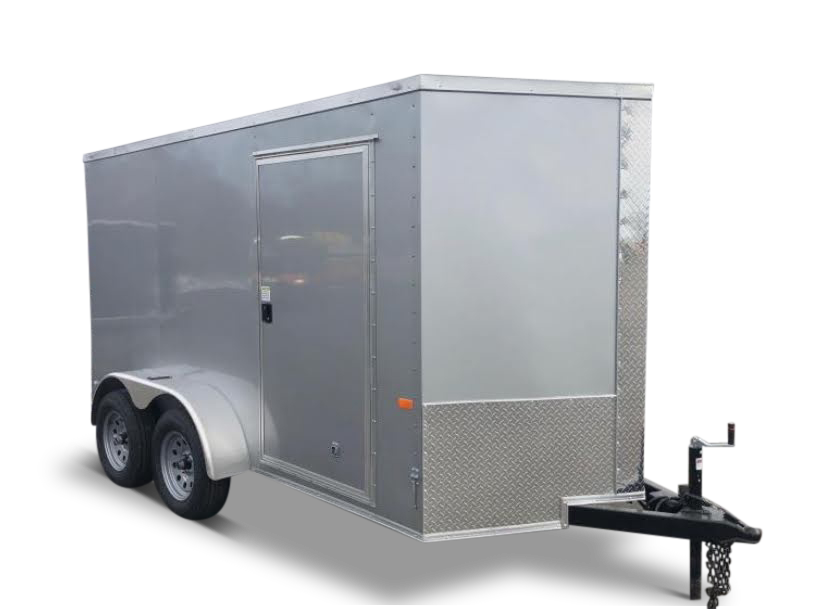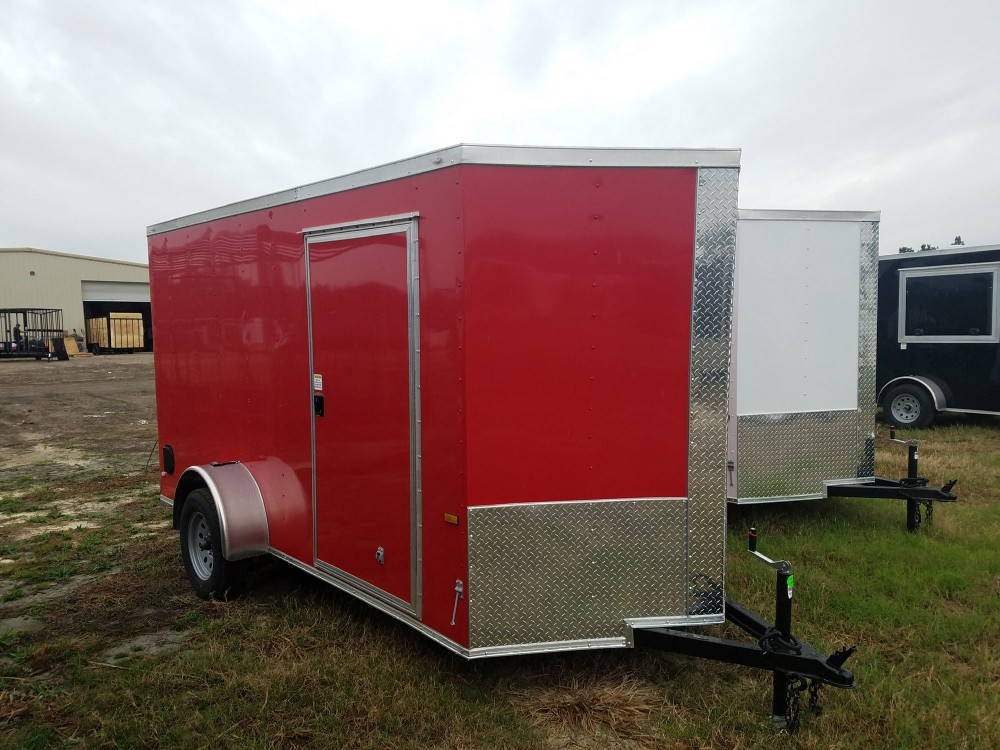
Gross Combination Weight Rating (GCWR) & Gross Vehicle Weight Rating (GVWR)
Enclosed trailer weight is arguably one of the most important considerations when it comes to picking out your new trailer. In considering a 6 x 12 enclosed trailer weight, you need to know two key measurements when it comes to how much your vehicle can safely haul. These are the Gross Vehicle Weight Rating, or GVWR, and Gross Combination Weight Rating (GCWR). These measures are provided per the manufacturer’s specifications as a threshold for the safe maximum load a vehicle and/or trailer can take. Let’s look at each in more detail:
Gross Vehicle Weight Rating (GVWR):
GVWR is the maximum weight determined by the manufacturer that a vehicle can safely hold. This includes all of the components of the vehicle, fuel, passengers, and any cargo within the vehicle. The vehicle’s “curb weight” or weight empty and the vehicle’s payload capacity added together equate to the GVWR. When towing, it is important to know the limitations of your vehicle so always keep the GVWR in mind as you’re loading up.
Gross Combination Weight Rating (GCWR):
This is the one trailer owners really need to be aware of. That’s because the GCWR is the maximum weight a manufacturer specifies is safe for both the vehicle and the towed trailer. The GCWR is basically the GVWR plus the weight of the trailer when fully loaded. Remember both your vehicle and the trailer have safe payload capacities. To put this in perspective, Ford.com lists the 2020 F-150XL SuperCrew’s GCWR as 13,100 pounds. This means the weight of the loaded trailer and the loaded vehicle should never exceed 13,100 pounds. Different options like axle ratios and engine size affect the truck’s max loaded trailer weight. We’ll cover payload versus towing capacity later in the post.
To make it really easy to find different trailer weights, a complete listing of all Renown’s trailer weights can be found on our Enclosed Trailers Weights page. Popular queries like 16 enclosed trailer weight and 6×12 enclosed trailer weight are all displayed. You can also see empty weight, tongue weight, and payload capacity for the many different sizes and axle options we carry.
Payload Capacity versus Towing Capacity
Payload capacity and towing capacity are sometimes used interchangeably but they are in fact two different important measurements for the trailer owners to have in mind.
Payload capacity is important both for the vehicle and the trailer. This measurement is indicated by the manufacturer as the maximum amount you can safely transport inside of the vehicle or trailer. Both the vehicle and the trailer will have their own payload capacity so it’s important to know each as you are loading up your cargo.
On the other hand, towing capacity applies to the tow vehicle’s maximum that it can safely haul with an attached trailer. Oftentimes, truck commercials will boast of their vehicle’s high towing capacity so many owners are aware of this number but may not consider payload capacity and how this all adds into the GCWR for safely towing your vehicle.
Ignoring these numbers can be extremely dangerous for you and other drivers sharing the road. We’ll highlight the reasons for this below.
Additional Considerations and Why Trailer Weight Matters
So far we’ve looked at the different measurements used to specify how much a vehicle can safely hold and transport. But, there are several other important considerations in the realm of trailer weights that should be accounted for in the safe operation of a tow vehicle and a loaded trailer.

- Single Axle vs. Tandem Axle: It’s important to remember that trailer length doesn’t always mean it can tow more than a shorter trailer. Most know that dual axle trailers will tow more than a single axle trailer. Shorter dual axles will very often have a greater payload capacity than a longer single axle trailer. Single axle enclosed trailer weight will typically be less than the same length trailer with tandem axles. This would equate to a lower GCWR like we looked at above.

For example, a 6 x 10 enclosed trailer weight might be significantly more than a 6×12 enclosed trailer weight when the 6 x 10 is a tandem axle model and the 6 x12 is a single axle. Empty, a 6×12 single axle enclosed trailer weight runs 1,200 pounds. Comparatively, an empty 6×12 tandem axle runs 1,800 pounds. That extra 600 pounds in a trailer of the same width and height is a really important consideration when examining how much your vehicle can safely haul.
- Gross Axle Weight Rating (GAWR): this is the maximum weight that each axle can safely support. If you have a well distributed load on two axles, each axle will more or less carry an equal share of the load. Obviously, a tandem axle will have a higher GAWR than a single axle trailer but this is also an important safety consideration for the tow vehicle. Gooseneck trailers attach to mounts in a truck’s bed which rests over the rear axle. Exceeding the vehicle’s GAWR can lead to a host of different problems, which can be exceedingly dangerous while in transport. When looking at trailers, be cognisant of your vehicle’s GAWR as well as the prospective trailers to be sure your intended use matches the trailer.
- Stability: overloading a trailer can be devastating while driving, especially at high speeds like on the interstate. Braking systems can overheat and fail, suspension can bend and break, tires can blow and cause whipping, and you can even have complete engine failure in the tow vehicle when the trailer is over its safe payload capacity.
- Stopping Distance: overloading a trailer and/or a tow vehicle can be extremely dangerous when it comes to your ability to stop. Most trailer owners know that the added weight increases your stopping distance but overloading a trailer can put extreme wear on the braking systems of either the tow vehicle or the trailer’s, if so equipped. Renown’s 6×12 tandem axle trailers come with an independent braking system to help your vehicle slow down but overloading the trailer can still be detrimental to the system.
- Max Tongue Load: this is the maximum weight which a trailer hitch can handle from the trailer’s tongue bearing down on it. Remember, hitch receivers have a much higher max tongue load than bumper hitches.
Tips for Safely Towing a Loaded Trailer
Towing adds additional stress to your vehicle and requires increased awareness on the road. Here’s several basics for safe towing:
- Distribute Weight and Cargo Properly: remember, around 60 percent of the cargo’s weight should be in front of the axles. Also, do your best to balance the load from side to side in your trailer. Keep anything that can move securely tied down so it doesn’t inadvertently shift when turning a corner or braking.
- Turn Wide: taking a corner too tightly can run your trailer into the curb and other obstacles. Be sure to make a wide enough turn to clear corners. Available options like Renown’s extended trailer tongue help make turning and maneuvering with a trailer easier.
- Braking: as we highlighted above, you will need more stopping distance with an attached trailer. A vehicle’s braking system is usually rated for its GVWR not the GCWR so if your trailer doesn’t have its own braking system, your vehicle is bearing all of that extra effort by itself.
- Accelerating: conversely to braking, acceleration will be affected while towing. Make sure when passing to especially give a lot of distance between your trailer and the slower vehicle. You may even need to downshift the tow vehicle in order to get better acceleration.
- Check Tire Pressure: before you get on the road with your trailer make sure to check the tires. Underinflated can heat up fast and fail which could mean losing control. Equally, overinflated can lead to uneven tread wear and severely impact traction and/or stopping power.
Following basic safe driving techniques and knowing your vehicle’s limits is critical to safely towing a trailer. If you have any questions about which trailer is right for your vehicle, our trailer pros are here to help. Contact us now.
Knowing the Numbers: Renown Helps You Find the Perfect Trailer for Your Set-Up
Our trailer pros are some of the very best in the business. We take the time to listen to your unique situation and then can offer the best options to fit your needs. We don’t believe in providing anything less than our very best each and every day. It’s the Renown Cargo Trailer difference and is right on our logo. We do our work to honor God and are thankful for the opportunity to serve your needs with integrity. When you are ready for a whole new trailer buying process, come visit us in Douglasville, GA or you can browse our entire selection online and have your trailer shipped just about anywhere in the U.S.
Contact a knowledgeable Renown Trailer expert now to go over which trailer would work best for you.
